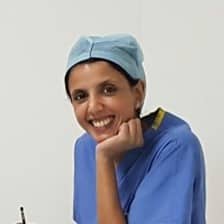Sushma Shankar
Transplant Surgeon and Scientist
Hi guys, I’m Sushma! I work as both a Transplant Surgeon and Scientist in Oxford. Read on to find out more about me and what I do, and check out the video at the bottom of this page!
My story
I grew up in Newcastle in the 1980s, with my parents, sister and brother. My parents were born in South India and travelled to the UK before we were born. There weren’t many people who looked like us in Newcastle back then, and the rest of our family remained in India. However, we made some really close friends who became a second family for us in Newcastle.
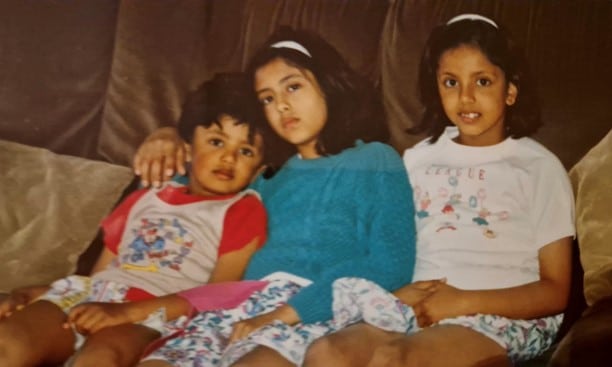
Me with my big sister and little brother, being made to sit still for a photo!
I was super lucky to be surrounded by extremely positive adults growing up. I was constantly encouraged to believe that I could do or be whatever I wanted, as long as I was willing to work for it. My parents would always tell me that my gender and colour should not stop me. Not once did they say, ‘No, you can’t be that when you grow up.’ They would say, ‘Ok great. How are you going to make that happen?’
I decided at the age of 7 that I wanted to be a window cleaner, like the man who washed our classroom windows. He looked so happy! A year later, I realised that I was scared of ladders. So I decided that I would be a marine biologist instead, as I quite liked the idea of swimming in the ocean. Sadly, I soon realised that I didn’t like fish very much, nor cold water. So I settled upon becoming an astronaut. My dad gave me a small telescope and helped me find Jupiter, which I thought was incredible. A few years later though, it occurred to me that there was so much suffering on our planet, that maybe I should focus on life closer to home than outer space.
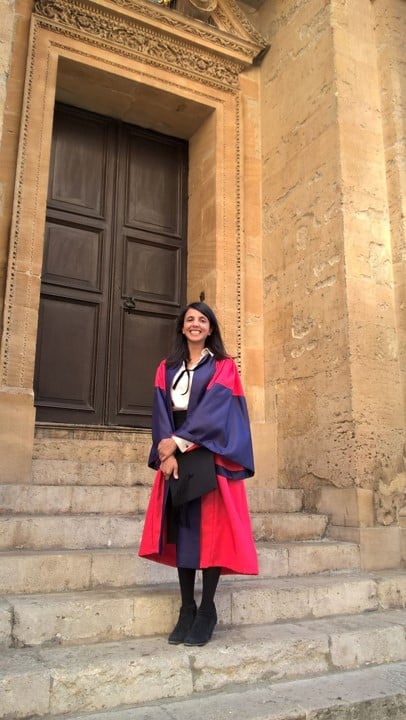
Receiving my PhD from University of Oxford
And that’s how I decided upon Science and Medicine! I finally figured out that I loved solving problems, travelling and that I wanted to help people in some way. I took Biology, Chemistry, Maths and French A Levels at school, subjects that I really enjoyed. I then joined Oxford University Medical School, where a whole new world of friends, travel, science and adventures opened up. I went on to train in surgery whilst also completing a research degree, called a PhD, in transplant research. As a doctor and as a scientist, I have been able to work and teach in many parts of the world, including Africa, Asia and the Middle East. It was the best decision I ever made!
My research
I split my time between working as a Transplant Surgeon and as a Scientist to help patients who need transplants.
People need a replacement organ (a transplant) when their own organs, such as a liver, kidney or pancreas, are no longer working. We help by giving these people organs donated by other people. The people who donate organs are usually dying and they no longer need their organs. They and their families give us permission to transplant their organs to those people who need them, usually strangers whom they have never met. I think this is extremely generous, kind and brave. By donating organs, these people and their families are saving other patients’ lives.
We all have immune cells in our bodies, which act as a defence system against external dangers like infections and cancer. When a patient receives a transplant from another person, their immune cells mistake the new organ as an external danger and attack it. To protect the transplant, we give the patient really strong drugs to slow down these immune cells. This is very helpful in protecting the transplant so that the patient can live a longer and healthier life. Unfortunately, these drugs can put the patient at risk of developing a serious infection or cancer. These side effects can harm the patient’s life.
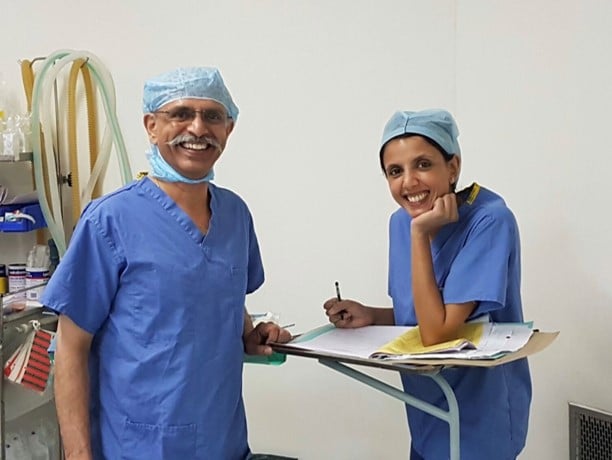
Me and Dad, who is also a surgeon. I joined him as his assistant for a charity trip to India, where we provided free healthcare and surgery to rural communities
My research focusses on understanding a special sort of immune cell which can control, or regulate, the other immune cells which attack organ transplants. We call them, ‘regulatory cells.’ There are lots of different types of regulatory cells, and I am especially interested in regulatory B cells. I think they do an amazing job of protecting organ transplants. I am trying to understand how regulatory B cells behave. One day, I hope that I can take them out of patients and grow them up in large numbers in the laboratory. I want to give them back to patients as a special cell therapy to protect their transplants whilst allowing immune cells to still defend patients against infection and cancer.
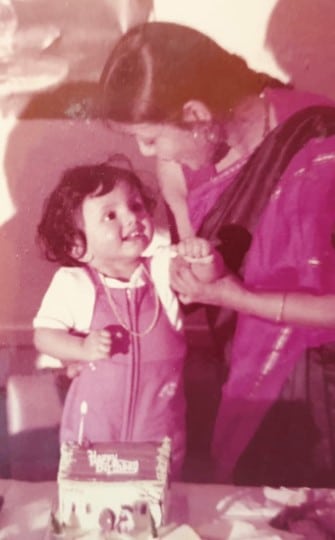
Me and Mum at my 1st birthday party
I love trying to make people better, both in the clinical world as a surgeon, and in the research world as a scientist. I find it really satisfying to help patients quickly with operations and to try to help future patients by discovering new transplant treatments and solving scientific problems. It feels more like a hobby and a passion than work, I feel very lucky to be able to say that!
Check out this video which gives you an idea of what I get up to on a day-to-day basis. Please be aware that between 3:10 and 4:07 there is a close-up of a human liver, which may make some viewers uncomfortable.

